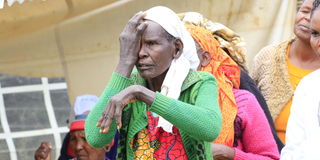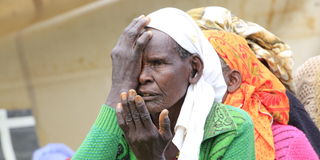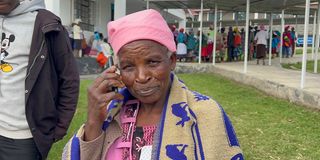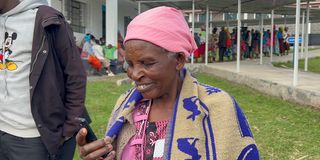
More than 1,500 patients were treated and 300 cataract surgeries were performed over a three-day medical camp in Narok County.
One evening four and a half years ago, Elizabeth Mosoni went to bed as usual. However, when she woke up the following morning, she could hardly see.
Gradually, the situation deteriorated until the 74-year-old grandmother was completely blind, and she had no idea what had happened to her.
Her children took her to the local clinic, but the medics there were unable to help and referred her to Narok County Referral Hospital for specialised treatment.
The family could not afford to travel from her rural home in Trans Mara to Narok for treatment.

Elizabeth Mosoni undergoes an eye test on May 22, 2025 before her cataract surgery during a medical camp in Emurua Dikirr, Narok County.
Elizabeth resigned herself to her fate and had to be guided everywhere and helped with what were previously simple domestic chores.
She became totally reliant on others, which was psychologically torturous for four and a half years. During which time she had no expectation of ever regaining her sight again given her advanced age.
On Thursday, she was taken to a medical camp in Emurua Dikirr Constituency. After undergoing tests, it was found that she had cataracts that had rendered her blind.
After several tests, Elizabeth was wheeled into an operating theatre for an operation that restored her sight, bringing her full circle from darkness to light.
“I reluctantly agreed to undergo the surgical operation as I had lost hope of ever seeing again,” she told the Nation after the successful corrective surgery at Emurua Dikirr Sub-county Hospital.

Elizabeth Mosoni undergoes an eye test on May 22, 2025 before her cataract surgery during a medical camp in Emurua Dikirr, Narok County.
Following an announcement at a church function the previous weekend, she was taken to the camp by family members.
“When the heavy bandages were removed from my eyes after the surgery in what appeared to have taken an eternity, and I saw the faces around me, I felt like I had been born again,” she said, beaming with joy.
Following her successful surgery, she will now be able to resume her normal life and perform domestic chores.
Most importantly, she said, she would be able to recognise people’s faces, see what is around her and avoid danger.
Her days were filled with silence and dependence, as her once-active life had shrunk to the confines of her home. Even performing ordinary daily chores became impossible.
For Elizabeth, the gift of sight means more than just improved vision — it is a return to independence. “I can now cook for my family and fetch water. I feel useful again,” she said.
“This is a life changing experience and I can only thank God and the medical team that took part in the surgery. I could not cook, clean, or even recognise the faces of my grandchildren. Now I can see. I am delivered from darkness to light,” she said, tears of joy welling up as she described her ordeal.
As Elizabeth walked out of the camp unaided, her steps represented not just those of a woman regaining sight, but of one reclaiming her life.

Eye specialists operating on a patient during a cataract surgery camp organised by the Maasai Mara Rotary Club at Emurrua Dikirr in Narok County on May 22, 2025.
Sponsored by the Rotary Club, the Kenya Society of the Blind and the Emurua Dikirr Constituency Development Fund (CDF), the Free Cataract Surgery Camp benefited hundreds of locals, some of whom underwent tests and corrective surgery.
Joy and relief filled the air at the free medical camp, where dozens of residents received life-changing treatment.
Those who attended received cataract surgery and general medical check-ups, offering new hope to many elderly residents of Narok and Bomet counties.
Medical officers at the camp confirmed that more than 1,500 patients were treated and 300 cataract surgeries were performed over the three-day period.
Ms Esther Kerich, another beneficiary, said that she was glad to have regained her full sight after undergoing surgery at the camp, and that she would now be able to educate others in her neighbourhood about the importance of seeking medical attention for eye problems.
“Some of the signs we have been ignoring with eye ailments and related issues have been clarified to us during the sensitisation exercise at the camp and even those who did not undergo surgery are able to go and educate others back at home,” she said.

Esther Kerich makes a phone call after her sight was restored following a cataract surgery on May 22, 2025 at Emurrua Dikirr in Narok County.
Ms Kerich said that elderly people in rural areas had suffered in silence for a long time as a result of lack of information about their health conditions.
“We are appealing to the national and county governments to work closely with donors and ensure that those in rural areas have access to medical services, especially the elderly who are faced with eye conditions,” she said.
Mzee Peter Sankei, a beneficiary, said that he had been given glasses following the tests he underwent at the camp, which had helped him to see clearly.
“I did not know that my eyesight had deteriorated over the years to a level I could not see images properly. My coming to the camp has assisted me a great deal and I am now able to see both close and far objects properly,” Mr Sankei said.
Dr Albert Masua, an ophthalmologist surgeon, said: “Cataracts are a leading cause of blindness among the elderly people in the society. But the condition is easily treatable with timely surgery.”
“The cataract conditions affects those who are 55 years and above, but there are those who are more prone to it because of their living standards, conditions and improper nutrition and diet and those living in arid areas where it is very sunny,” he said.
However, there are cases where cataracts affect people younger than 50 years.
Dr Masua said there are several types of cataract, including traumatic cataracts. In terms of gender, more men than women have the condition because they are more prone to trauma.
“Women's cases are mostly because of age and their working conditions, including gardening and other activities. But, overall, there are more men than women with the condition,” he said.
Dr Masua said that this eye condition is most prevalent in rural areas due to the living conditions and the inability to access medical services at an early stage.
He said that the ailment is prevalent in rural areas due to the living conditions and the lack of access to medical services at an early stage.
Most pastoral communities are prone to cases because of the arid conditions and their nomadic lifestyle, which means they have limited access to health facilities. Other external factors include heat and trauma, Dr Masua added.
However, there are also cases where genetics play a role, especially in north-eastern and arid areas of the Rift Valley.
The medical professional added that the biggest challenge in cataract intervention is finding people with the skills to carry out successful surgeries and ensuring that there is no shortage of equipment and consumables in theatre. "It is really a big challenge and the biggest contributors to the medical camps in rural areas are donors,” Dr Masua stated.

Esther Kerich scrolls through her phone after her sight was restored following a cataract surgery on May 22, 2025 at Emurrua Dikirr in Narok County.
He said that people with eye problems should visit level four facilities and county referral hospitals for check-up and corrective surgery where necessary.
“The tell-tale signs for cataracts is one seeing things in double; when exposed to light they see rainbows; at an advanced stage they are prone to having headaches; they fall down because of misjudging distance; and they struggle to do their normal activities,” Dr Masua said.
Ms Catherine Mutula of the Maasai Mara Rotary Club said that, in the days ahead, the partners would organise other camps in rural areas of Narok County to give locals access to medical services.
“This is the fourth medical camp we have organised in the region and others are lined up for other regions. Those who have received medical services are also expected to have follow-up check-ups in the coming weeks,” she said.
According to the Ministry of Health records and the World Health Organization (WHO), cataract is a major contributor to blindness in Kenya, causing 43 per cent of blindness cases, compared to 19 per cent for trachoma and 9 per cent for glaucoma.
According to the WHO, cataract prevalence in Kenya is 0.7 per cent, with 14,500 new cases reported yearly, and the majority of the rural population is unable to access medical services.
Residents and local leaders have praised the initiative and called for more outreach programmes to benefit those who cannot afford specialised care.
“This medical camp has given dignity and hope to our people whose sight has been restored, while others have been sensitised on what they need to do when they have eye ailments,” said Mr Maxwell Nyongesa, the Transmara East Assistant County Commission (ACC).





